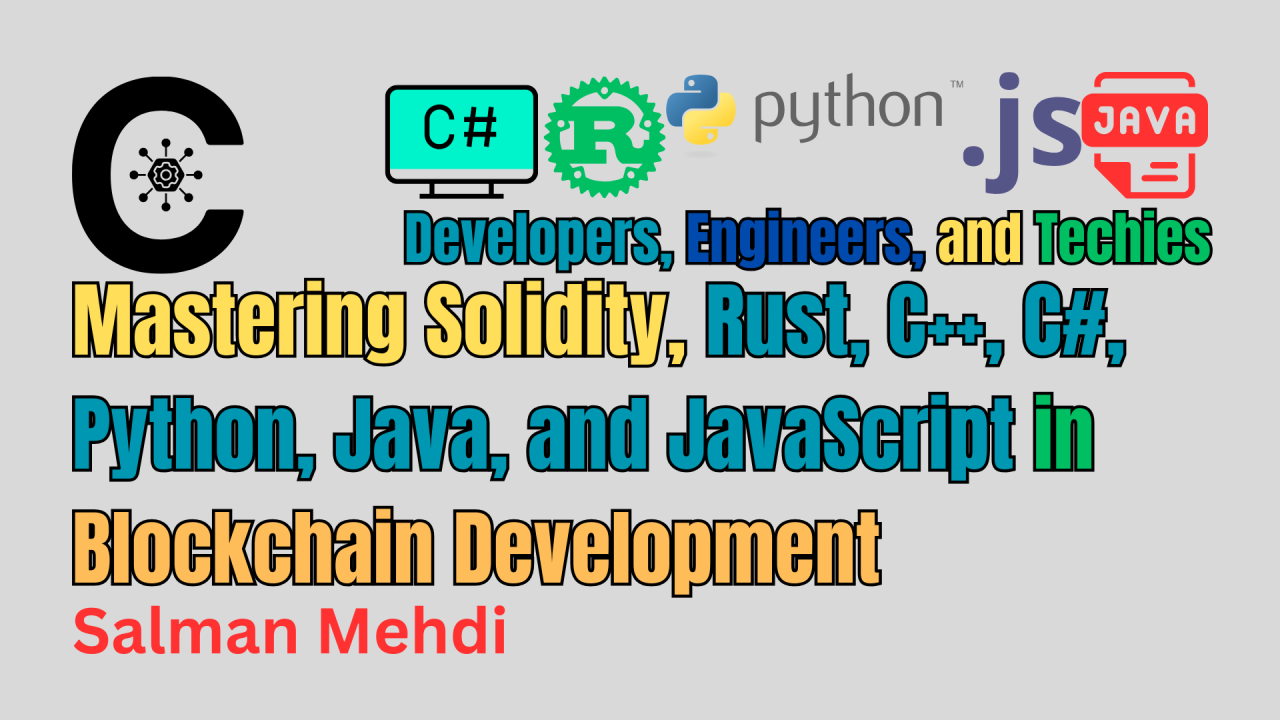
Top Coding Languages for Blockchain Engineers & Devs
Syed Salman Mehdi Mosvi
Full Stack IT Specialist | Network Engineer | Digital Transformation Expert
Developers, Engineers, and Techies: Mastering Solidity, Rust, C++, C#, Python, Java, and JavaScript in Blockchain Development
Blockchain technology is rapidly advancing, requiring a diverse set of programming skills and technical acumen. As blockchain applications continue to expand across industries—from finance and supply chains to healthcare and digital identity—the need for developers and engineers skilled in languages like Solidity, Rust, C++, C#, Python, Java, and JavaScript has grown exponentially. Each of these languages brings unique strengths to the blockchain world, enabling developers to create secure, scalable, and efficient solutions.
This article explores how different programming languages contribute to blockchain development, the role each language plays, and why mastery in these languages is crucial for today’s blockchain engineers and tech enthusiasts.
Solidity: The Go-To Language for Smart Contracts
Solidity is the primary language for developing smart contracts on the Ethereum blockchain, and it is integral to decentralized finance (DeFi), NFTs, and other Ethereum-based applications. Solidity’s syntax is influenced by JavaScript, Python, and C++, which makes it approachable for developers familiar with these languages.
Key Features and Use Cases:
Why Learn Solidity? For anyone looking to develop dApps or dive into the world of smart contracts, Solidity is indispensable. It’s the gateway to the Ethereum ecosystem, which remains a leader in the blockchain space.
Rust: A High-Performance Language for Blockchain Infrastructure
Rust is known for its memory safety, concurrency, and performance, making it an ideal choice for building blockchain infrastructure. Rust’s popularity has surged with its use in building protocols like Polkadot and Solana.
Key Features and Use Cases:
Why Learn Rust? Developers aiming to work on high-performance blockchains or develop scalable blockchain solutions benefit from Rust’s efficiency and safety features, essential for building robust blockchain applications.
C++: The Foundation of Blockchain and Cryptographic Development
C++ is a longstanding language in systems programming, known for its performance and control over system resources. Bitcoin’s original code was written in C++, and it continues to play a vital role in blockchain development.
Key Features and Use Cases:
Why Learn C++? For developers working on core blockchain infrastructure, C++ offers control and performance necessary for building and maintaining secure blockchain networks.
C#: Blockchain for Enterprise Solutions
C# has emerged as a powerful tool for enterprise blockchain solutions. With its robust development ecosystem, C# is popular among developers working on Microsoft Azure blockchain solutions and private, permissioned blockchains.
Key Features and Use Cases:
领英推荐
Why Learn C#? C# is ideal for developers interested in building enterprise-grade blockchain applications that integrate well with existing business systems, especially on Microsoft’s cloud platform.
Python: A Language for Blockchain Prototyping and Data Analysis
Python is known for its simplicity and ease of use, making it a popular choice for blockchain prototyping, data analysis, and even some smart contract development.
Key Features and Use Cases:
Why Learn Python? Python is perfect for those interested in blockchain data analysis or developing blockchain concepts quickly. Its wide adoption in data science also makes it valuable for blockchain developers interested in data-driven applications.
Java: Powering Blockchain Interoperability and Versatility
Java is widely used in enterprise environments, making it a popular choice for blockchain solutions requiring cross-platform interoperability.
Key Features and Use Cases:
Why Learn Java? Java’s versatility in enterprise settings makes it valuable for developers looking to build secure, scalable blockchain applications within large organisations.
JavaScript: Essential for dApp Development
JavaScript has become a core language for web development, making it integral to creating decentralised applications (dApps) with interactive front ends that communicate with blockchain backends.
Key Features and Use Cases:
Why Learn JavaScript? JavaScript is essential for blockchain developers focusing on dApp development, as it bridges the front-end and blockchain, allowing users to interact seamlessly with the blockchain.
Conclusion: Building a Strong Skillset for Blockchain
For today’s developers, engineers, and techies, proficiency in these languages—Solidity, Rust, C++, C#, Python, Java, and JavaScript—is key to succeeding in blockchain development. Each language offers unique strengths, from building secure infrastructure and smart contracts to creating dynamic, user-friendly dApps. Whether working on blockchain protocols, enterprise solutions, or front-end dApp interfaces, mastering these languages allows developers to contribute to the next generation of decentralized solutions.
Author: Syed Salman Mehdi, an experienced IT specialist and blockchain enthusiast, is passionate about exploring emerging technologies and their applications in blockchain development. He shares insights and guides for tech professionals on his blog at multithinker.wordpress.com and can be reached via LinkedIn at linkedin/in/multithinker.
#Blockchain #Solidity #Rust #Python #Java #JavaScript #C++ #CSharp #Developers #Programming #Tech #Crypto #SmartContracts #BlockchainDevelopment #Web3 #TechTrends #Innovation #DeFi #Cryptography #DecentralizedTech #SoftwareEngineering
CEO at Neurosoft Inc. Karachi
2 周Interesting
Software Engineer
2 周Excellent breakdown of programming languages for blockchain! This is a valuable resource for anyone interested in getting started with blockchain development. The explanations of each language's strengths and use cases are very helpful. Solidity for smart contracts and JavaScript for dApps particularly resonate for me. I'd be interested to hear your thoughts on the future of blockchain development and which languages will be most prominent.
Software Engineer
2 周Excellent breakdown of programming languages for blockchain! This is a valuable resource for anyone interested in getting started with blockchain development. The explanations of each language's strengths and use cases are very helpful. Solidity for smart contracts and JavaScript for dApps particularly resonate for me. I'd be interested to hear your thoughts on the future of blockchain development and which languages will be most prominent.